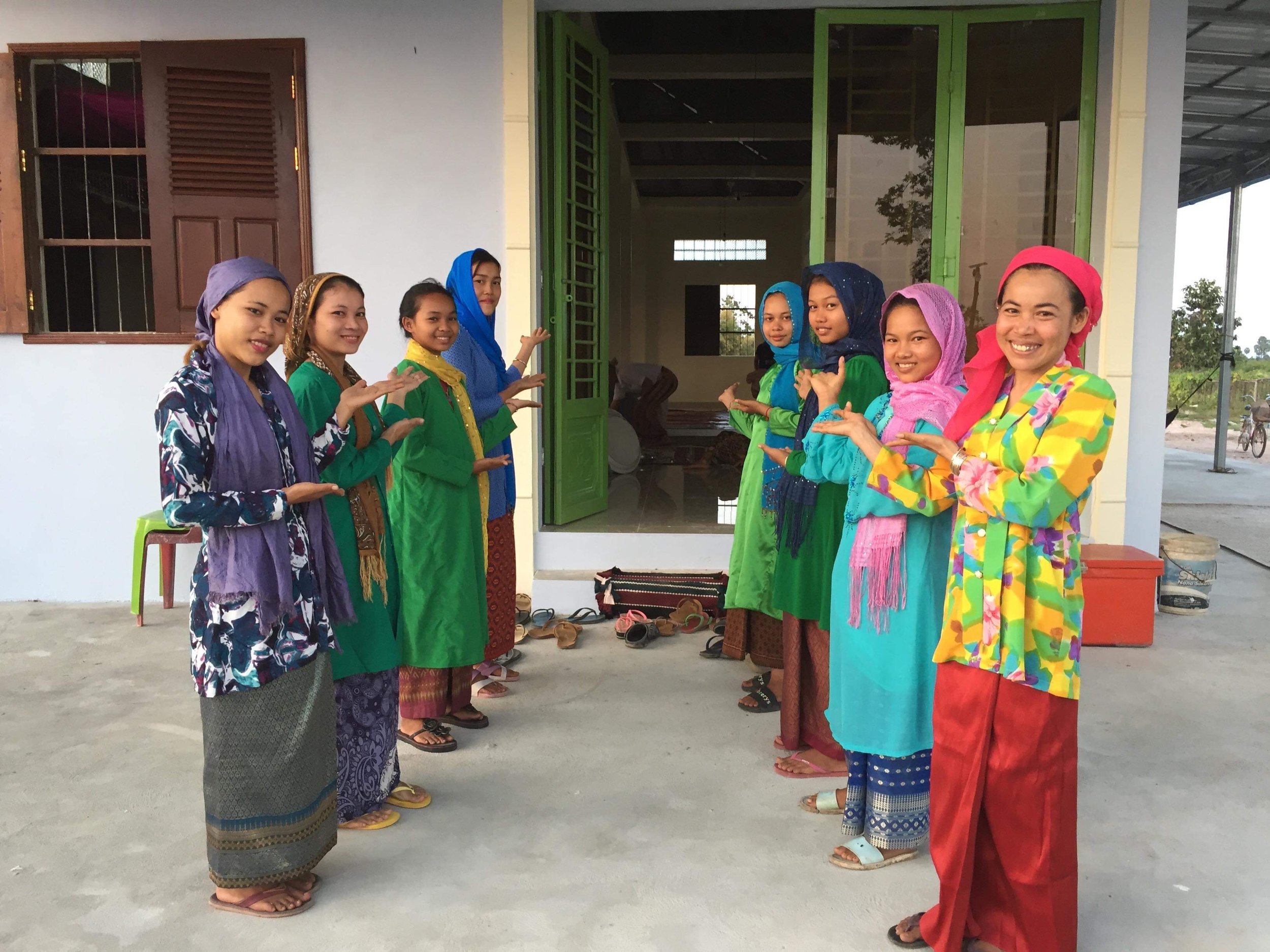New Workshop Celebrates Success for Red Dirt Road Women and Village
/By Menghun Kaing
Kids run around. Chickens cluck. Cows wander the village. And then there’s the squeaky noise from the sewing machines of the women of Red Dirt Road. One can often hear laughter and chitchat as the women paddle on their machines, stitching beautiful clutches and shawls. That is a typical day at Tramoung Chrum, a small remote Cham village in Cambodia with no electricity or running water and accessible only through a red dirt road.
But today, the women were not on their sewing machines. They were gathered under a tamarind tree in front of Saly’s house for something much more exciting—the opening ceremony of their new workshop!
“I’m so happy I can’t describe it in words!” said Saly, Red Dirt Road’s founder. She had never imagined that she and the other 12 women seamstresses would be opening a new workshop of this size and importance.
Saly’s parents grew up in the same village and got engaged through an arrangement by their parents just two months before the Khmer Rouge genocide took over Cambodia and went on to kill almost two million people. Cham, a Muslim ethnic minority in Cambodia that Saly and her parents belong to, was disproportionately targeted by the regime due to their religious beliefs.
During the genocide, Saly’s father, Mout San, was told to marry another woman (forced marriage was the regime’s widespread practice and refusing to accept an arrangement was often viewed as betraying the regime and could result in death). But Mout San did not know the woman and had no interest. “I lie that she was my relative, so they did not force me,” he said.
After the Khmer Rouge fell in 1979, Mout San and his fiancé, Mai, reunited and finally tied the knot. They started a new life in the turmoil of the post-genocide Cambodia. Four years later, Saly was born.
Mout San and Mai had modest hopes for their baby girl. “I only hoped that she would be able to farm in the future.” It was not possible to send Saly to school at the time, Mout San said. After all, both Saly’s mother and her grandmother never went to school. But one thing was clear to her father: Saly was a strong spirited child and was going to be okay. “From a young age, if she wanted to do something, she went and do it,” her father recalled.
As she grew up, however, Saly had much bigger dreams. “I used to sing to myself when I tended to the cows in the field,” she told me, laughing. Saly laughs easily. She radiates her positive energy to those around her. She dreamed of going to school, getting a job, and traveling far from her village, to other parts of Cambodia to see other people and their ways of living.
But with no education and limited employment options in Tramoung Chrum, at the age of 19, Saly packed up and moved to Phnom Penh city to work as a seamstress in a garment factory. She first started with stitching buttons to shirts every day, six days a week. Her basic wage was $45 per month. After six years in the industry, Saly was tired and knew that she needed something more sustainable. “They will stop hiring me when I turn 35 or 40 years old,” Saly thought to herself. So she had a new dream: to run a sewing business in her village where she could work from home and live with her family.
In 2009, Saly met MIT professor Alan Lightman and his daughter Elyse Lightman. Saly shared her dream, and Elyse bought her the first sewing machine and provided an initial seed funding to start a sewing business. At the start, the business struggled, because Saly’s products did not sell, as Saly lacked marketing and sales skills. But she did not give up. In 2011, Marie Eckstein, a successful corporate executive from America, met Saly. “I was impressed with her tenacity, her energy, her determination...in some ways, she reminded me of myself,” Marie recalled her first encounter with Saly. That connection convinced Marie to support Saly to continue her business.
Now 7 years later, Saly is employing 12 women in her village. Many of the women were either former garment workers or had no employment in the village. Red Dirt Road provides an opportunity for them to work for a fair wage and live with their family. Sid Tith, 33, one of Saly’s first employees, said that she had previously worked as a garment worker in Phnom Penh city, but joined Red Dirt Road because it allowed her to live with her parents, and now her 16-month old baby and husband.
“Working here, I can live with my family. And I can chitchat with my friends [colleagues] while working. In the factory [in Phnom Penh], you are not allowed to talk and laugh while working,” Sid said.
Red Dirt Road has transformed Tramoung Chrum beyond providing employment opportunities. Today, part of the business' profit goes to the Red Dirt Road Foundation, which supports an English program for children in the village. Additionally, through the Red Dirt Road Foundation, under the leadership of Lin Alessio, a new latrine and sanitation initiative, as well as a farming program that provides nutrition and improves well-being of the villagers have been introduced.
Saly beamed with tears when talking about the new workshop and how far she has come from her first sewing machine. “I feel that I have been successful. My mother would have been even happier than me, because she was always there to support me early on in this business.”
Looking to the future, Saly wants electricity, roads and a health clinic for the village. She also hopes to employ 100 more women. “If 100 more women have a job here, it means 100 women less going to work in Malaysia as maids,” she said, her eyes lit up with excitement.
For now, Sid Tith has a bitter sweet feeling about the workshop. “I’m excited to have a nicer and bigger workspace. But I will miss the old workshop, because there are many good things and happy times there.” As the sun went down on the roof of the new workshop, the women sat down to clean a pile of dusty dishes that they had borrowed from the village’s mosque for the opening ceremony. Excitement, laughter and hope filled the air.
Front view of newly completed workshop
Red Dirt Road workshop for the last six year in saly’s family home






